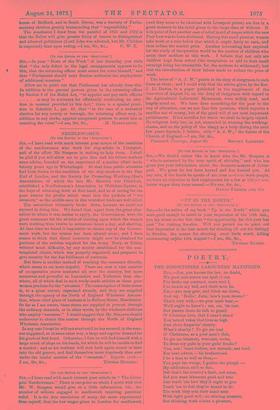[TO THE EDITOR OF TEE "SPECTATOR."] STR,—I have read with
much interest your article on "The Liver- pool Needlewomen." There is one point on which I could wish that Mr. W. Simpson would give us a little information, viz., the number of widows engaged in needlework receiving parochial eelief. It is the firm conviction of many, far more experienced than myself, that the low 'wagesgiven in London for needlework (and they seem to be identical with Liverpool prices) are due in a great measure to the relief given to the large class of widows. It is in point of fact another case of relief in aid of wages which the new Poor Law was to have abolished. Having this small pension, women take work at a rate below that which it ought fairly to earn, and thus reduce the market price. Another interesting fact required for the study of the question would be the number of children who assist their mothers at this work. I believe that not only are children kept from school (the temptation to add to their small earnings being too irresistible for the mothers to withstand), but that the introduction of their labour tends to reduce the price of work.
The letter of "A. J. W." points at the duty of clergymen in such times as these ; and I could wish that the advice given by the Rev. J. LI. Davies, in a paper published in the supplement of the Guardian of August 14, on the duty of clergymen with regard to the Agricultural Labourers' Movement, were widely read, and largely acted on. We have done something for the poor in the way of education, can we not face this question, which requires a sacrifice not of money, but of the good-will of our most important parishioners. It is a sacrifice for which we shall be largely repaid. No religious body has, as yet, succeeded in winning the working- classes, and on the policy of the clergy as a body during the next few years depends, I believe, with "A. J. W.," the future of the Church of England.—I am, Sir, &c., Tamicorth Vicarage, August 20. BROOKE LAMBERT.


































 Previous page
Previous page